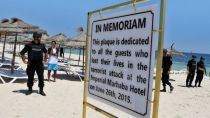 Could the Foreign and Commonwealth Office (FCO) have done more to prevent the murders of 30 Britons in Tunisia last year?
Could the Foreign and Commonwealth Office (FCO) have done more to prevent the murders of 30 Britons in Tunisia last year?
In June 2015 the Britons and eight other foreign nationals were murdered when Seifeddine Rezgui attacked a beachfront hotel in Sousse, Tunisia. The attack, later claimed by Daesh, came just three months after 22 people, mostly European tourists, were killed by gunmen in the Bardo National Museum, in Tunisia’s capital, Tunis.
At the pre-inquest hearing in the High Court today, the counsel for the families, Andrew Ritchie QC said “there is a line of thinking within some of the families that the FCO may have failed in their responsibilities to the 60,000 British citizens that went out per month to Tunisia between Bardo and Sousse”. Bearing in mind the main inquest is not due to start until January 2017 and today was meant just to run a procedural finger over the administration, it was an unexpectedly strong opening salvo.
Three weeks ago Judge Akremi, the Tunisian investigator, released his report into the Sousse attack of 26 June. His Honour Judge Loraine-Smith, chair of the Inquiry, said he had seen early parts of the translation and it was “illuminating [and] there’s the possibility of damage to national security by full release on what little I’ve seen”. Andrew O’Connor QC, counsel for the Government explained: “The detailed consideration of security measures in Tunisia, including the shortcomings of some of those measures, would undoubtedly assist those planning further attacks.”
Mr Ritchie hadn’t finished with the Foreign Office. He said there was concern over the FCO’s “practice of cosy chats with the travel companies” who were more interested in their ability “to run a profitable business”, regardless of FCO advice that there was “a high risk of terrorist activity, including in tourist areas”.
In an inflammatory passage he hinted that the FCO had acted to protect tour operators like Thomas Cook and Thompson. The no-refund policy whereby bookings can only be cancelled and refunded if the FCO has recommended a travel ban to the destination was central to it all, he suggested. He noted that after the March attack there was no evidence of existing bookings being cancelled, perhaps due to the no-refund policy. Instead of recommending a travel embargo after the Bardo attack in March, Mr Ritchie said the FCO had “had discussions with local authorities who said, ‘This will be catastrophic to us if you embargo’, and [holiday companies] said, ‘Don’t do it. We will increase security’”. Unsurprisingly all such suggestions were dismissed by Andrew O’Connor for the government.
A lot of this was posturing for the main inquest. The counsel for the families wants the Inquiry to determine whether or not the British Government breached Article 2 of the Human Rights Act – the right to life – through the advice, or lack of it, from the FCO. He wants to introduce evidence from a security expert who works in an “anti-terrorist Western organisation” who might criticise the FCO by concluding “they mucked it up”.
The next pre-inquest hearing is set for December 1st and will specifically address whether the issue of Article 2 of the Human Rights Act is within the scope of the Inquiry. If the Chairman determines it is, and if he later decides the Government was culpable through the FCO’s advice (or lack of it), the compensation claims will run into many millions.